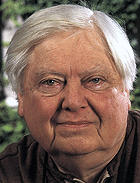“A Temple of Texts” by William H. Gass, Ph.D., the David May Distinguished University Professor Emeritus in the Humanities in Arts & Sciences, is the 2007 winner of the $30,000 Truman Capote Award for Literary Criticism in Memory of Newton Arvin.

The Capote award — the largest annual cash prize for literary criticism in the English language — is administered for the Truman Capote Estate by the Writers’ Workshop at the University of Iowa.
“Some years ago, I served as a nominator for this award, so I know how scrupulous the process is and how serious the standards are,” Gass said. “That certainly makes it even more significant for me. It is also given by the Truman Capote Literary Trust as a memorial to Newton Arvin, a scholar and critic whose own practice brought honor to the field. If you look at the list of previous winners, you will see every other reason why I am so pleased.”
Gass’ book, published in 2006 by Knopf, was selected for the award by an international panel of prominent critics and writers — Terry Castle, Garrett Stewart, Michael Wood, John Kerrigan, Elaine Scarry and James Wood — each of whom nominated two books. Books of general literary criticism in English published during the past four years are eligible for nomination. After reading all the nominated books, each critic ranked the nominees.
Both Kerrigan and Scarry are past recipients of the award.
Gass will formally receive the award and present a lecture this fall in a ceremony at the University of Iowa.
Gass has been a prominent figure in American letters for decades as not only a critic, but also a novelist, short-story writer, essayist and founder of the International Writers Center, now known as The Center for the Humanities in Arts & Sciences. He has three times won the National Book Critics Circle Award for collections of essays.
A review of “A Temple of Texts” in Washington Post Book World explained: “No one is better than William H. Gass at communicating the sublime and rapturous excitement of reading. This essayist, novelist and teacher is now in his 80s, and yet he still approaches books as if he were a young man hurrying to a rendezvous with a gorgeous older woman.
“When Gass describes the diction of Robert Burton or Gertrude Stein, the sentences of John Hawkes or Robert Coover, he shifts constantly between reverent awe and visceral eagerness, between a hunger for more and a touching sense of gratitude. Yes, gratitude, for how else can an encounter with great beauty leave us but feeling riven, blessed and thankful?”
Stephen Schenkenberg wrote on identitytheory.com: “Throughout the book’s 25 essays, Gass is the champion — sometimes joyful, sometimes harsh — of intellectual fitness. For him, reading is a form of aerobics. It is a demanding, exertive, physical act, and as such, it stretches, tones and conditions those who are turning the pages. …
“This is one of William H. Gass’ greatest skills: articulating and, indeed, celebrating how the finest artworks find a physical place in our lives. And in this, his most personal and generous essay collection, he does it so often and so magically that the book almost rattles when I carry it.”
The Truman Capote Estate announced the establishment of the Truman Capote Literary Trust in 1994 during a breakfast at Tiffany’s in New York on the 40th anniversary of the publication of Capote’s novella “Breakfast at Tiffany’s.”
Past winners of the Capote award include British scholar P.N. Furbank, Helen Vendler of Harvard University, John Felstiner of Stanford University, pianist and scholar Charles Rosen, the late Malcolm Bowie, Declan Kiberd of University College Dublin, Irish Nobel Laureate Seamus Heaney, Susan Stewart of Princeton University and Angus Fletcher.
In addition to the administration of the literary criticism award, the Writers’ Workshop involvement with the trust includes awarding Truman Capote Fellowships to University of Iowa students in creative writing.
The establishment of the Truman Capote Literary Trust was stipulated in the author’s will, and the annual Truman Capote Award for Literary Criticism in Memory of Newton Arvin reflects Capote’s frequently expressed concern for the health of literary criticism in the English language. The awards are designed to reward and encourage excellence in the field.
Newton Arvin, in whose memory the award was established, was one of the critics Capote admired. However, Arvin’s academic career at Smith College was destroyed in the late 1940s when his homosexuality was exposed.